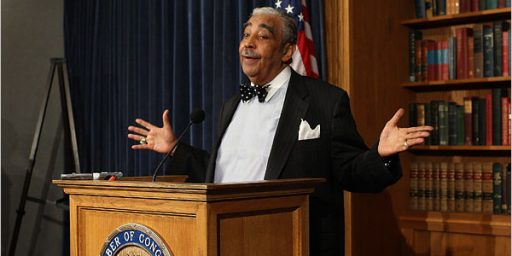Take from the Super Rich and Give to the Rich
That is the effect of Charles Rangel’s tax proposal. Mankiw sums up the proposal nicely,
Thus, as a first approximation, the plan increases the progressivity of the tax code by redistributing income from the very rich (e.g., CEOs, hedge fund managers, superstar athletes and actors) to the upper middle class (e.g., doctors, lawyers, congressmen).
Charlie Rangel, a man of the people…just not normal people such as middle class schlubs like me and most people reading this blog.
According to the Tax Policy Center here is the effect of the tax proposal in terms of percentage of income (on average, results for individuals will vary).
- Those in the bottom Quintile get a tax cut equal to 1% of income.
- Those in the 80th-90th percentile a tax cut equal to 1.1%.
- Those in the 90th – 95th percentile receive a tax cut equal to about 1.5% of income.
- Those earning incomes between $500,000 to $1 million will see a tax increase of 2.2% of income.
- Those earning over $1 million will see a tax increase of 4.5% of income.
So, just as with the Bush tax cuts the bulk of the money will go to those in the top income percentiles. Talk about pandering to the rich and successful.
Actually, the problem Rangel is running into is that most of the income tax is collected from the top income percentiles so naturally when you cut their taxes they get a much larger dollar benefit than those at the lower end of the income distribution.





Questionable policy; good politics. Remember George Bernard Shaw’s observation that when you rob Peter to pay Paul you can always depend on the support of Paul.
Well, what you call “rich” Mankiw calls “upper middle class”. How you characterize it depends on your
partisan biasperspective I guess.It is a interesting bracket. I doubt a $200,000 income household living in New York or San Francisco trying to put four kids through college would consider themselves rich. Of course, an $80K income household doing the same thing in Peoria probably would, and a $35K income household anywhere would consider both rich.
I am quite pleasantly surprised by this bill, particularly given how the bogeyman Rangel was characterized by Republicans before the midterms. This bill strikes me as a very reasonable effort to fix some real problems in the tax code that are hurting a lot of people in the middle class. It allows the majority of taxpayers, including all the middle class (upper, middle, lower) to get off of the automatic annual AMT tax increase escalator and does so in a revenue neutral manner. Sure, it would be great to see all income taxes flattened and lowered somewhat, but Rangel is a Democrat after all.
Anyway, given the wild out of control spending of the last six years, an overall cut here would just continue to push more of the burden on to the next generation to pay for it. At some point the piper will be paid in either taxes or inflation.
I cannot help but wonder what the tone of Steve’s post would have been if this bill had been submitted by a Republican.
I’m a little puzzled by your comment, mw:
In the context of the Rangel proposal are you suggesting that the government has an obligation to maintain people at a middle class standard of living in New York or San Francisco?
What I’m trying to ferret out is what’s the argument for government action in this instance?
Me too – I agree with the analysis and the commendation in mw’s comment. I’d add that I hope this leads to a reconfiguration of AMT altogether. I can’t understand why state taxes aren’t allowed but charitable contributions are, for instance. And if the AMT is going to be overhauled in a way that doesn’t prejudice, say, NYC for the benefit of an opera, church, or museum, Rangel’s the guy to do it.
Why don’t we just tax all income over $100k and distribute earned income credits to everyone under $100k? Wouldn’t that be nice, we’d be equal?!
At the same time, we could tax all Grade Point Averages over 3.6 and give those less fortunate/skilled higher GPAs so they have a better chance of obtaining that cushy job. Why should the overachievers be the only ones with an air conditioned office?
/sarcasm *
* just in case anyone is confused.
The classes benefitting are largely still working for a living. Those paying more are disproportionately ‘earning’ capital gains – that’s purportedly the goal here – to capture some of the income being misrepresented as capital gains.
Remember the luxury tax. It was the pain free way to raise some revenue and only the rich would pay. Joe Lunchbucket and his manager James Briefcase wouldn’t even notice. Just put a tax on the big ticket toys (yachts, jewelry, etc) that only the rich could afford. What could be better?
Of course it didn’t quite work out that way. The rich just bought their toys outside of the US. The US yacht building business started laying off Joe and James because their business went in the toilet.
Not let’s think about who is most able to avoid this tax increase? Theodore Silverplatter establishes residency in one of those upstart eastern European countries that have a low fixed tax rate. The people selling to him and providing services to him start to feel the pinch. Especially when we are talking about when all is said and done a marginal tax rate of 50 to 60% (e.g. if you take the cap off social security income).
Now consider some facts from the Bush tax cut.
Nobel Peace laureate Al Gore believes global warming is “an inconvenient truth.” Here are some economic truths that America’s liberal leadership finds too inconvenient to support.
Tax rate reductions increase tax revenues. This truth has been proved at both state and federal levels, including by President Bush’s 2003 tax cuts on income, capital gains and dividends. Those reductions have raised federal tax receipts by $785 billion, the largest four-year revenue increase in U.S. history. In fiscal 2007, which ended last month, the government took in 6.7% more tax revenues than in 2006.
These increases in tax revenue have substantially reduced the federal budget deficits. In 2004 the deficit was $413 billion, or 3.5% of gross domestic product. It narrowed to $318 billion in 2005, $248 billion in 2006 and $163 billion in 2007. That last figure is just 1.2% of GDP, which is half of the average of the past 50 years.
Lower tax rates have be so successful in spurring growth that the percentage of federal income taxes paid by the very wealthy has increased. According to the Treasury Department, the top 1% of income tax filers paid just 19% of income taxes in 1980 (when the top tax rate was 70%), and 36% in 2003, the year the Bush tax cuts took effect (when the top rate became 35%). The top 5% of income taxpayers went from 37% of taxes paid to 56%, and the top 10% from 49% to 68% of taxes paid. And the amount of taxes paid by those earning more than $1 million a year rose to $236 billion in 2005 from $132 billion in 2003, a 78% increase.
Finally, another inconvenient truth is that there have been 49 consecutive months of job growth as a result of the economic expansion induced by President Bush’s 2003 tax rate reductions.
Anyone who write this is a liar or an idiot.
Take your pick.
End the Laffer madness.
Andy,
I note you don’t contend with the specific facts raised. It’s nice to be sure of your beliefs, but when you are so sure that you ignore facts and just rant, do you really think that persuades others or in any way makes for a better world?
It’s best to apply the general principle of Wall Street Journal Op-Ed and Editorial interpretation: anything printed there can be safely presumed to be either false or misleading until proven otherwise. It certainly applies to the Op-Ed in question and works about 9 out of 10 times. 10 out of 10 when it comes to taxes (unless they let some commie pinko write one like today with Rangel).
Not at all. I was commenting on SV’s use of the relative term “rich” as a pejorative when applied to the Rangel proposal.
If you are referring to the Rangel proposal itself, I’d suggest that it is an attempt to undo the damage from a particularly onerous and badly implemented bit of past government action. Specifically the AMT, which (in concert with inflation) continues to drive more and more of the American middle class into carrying a higher tax burden than was intended by the initial AMT legislation.
As I implied, my preference would be for a flat a tax as possible with as few exceptions as possible. That does not seem to be in the cards. The Rangel proposal is incrementally better than what we have now.
mw,
I like the way you think here. If the problem being solved is that the AMT has gone beyond its initial scope, lets go back to the original income tax rates.
The presidential election of 1912 was contested between three advocates of an income tax. The winner, Woodrow Wilson, after the ratification of the Sixteenth Amendment, called a special session of Congress in April 1913, which proceeded to pass an income tax of 1% on incomes above $3,000 and applied surcharges between 2% and 7% on income from $20,000 to $500,000. A few years later the Supreme Court kissed and blessed progressivity.
While it’s not a flat tax, I think a maximum of 7% is conducive to a growing economy.
ugh,
So you hurl insults but don’t bother dealing with the facts presented.
and, yetanotherjohn, the max was raised just five years later to 77%, because the US had to fight a war. We did the same thing for WWII. Average rate for war time, then, is somewhere north of 75%.
jpe,
In WWII the US government was 40 to 45% of GDP, most of that going to the war effort. Today, the US government is ~20% (+/- a couple points) and about 6% is going towards defense. So trying to justify a high tax rate based on the war is a non-starter.
Let’s see if anyone points out the idiocy of this comment. I haven’t bothered to read all the subsequent comments because this one was just so freaking hilarious!
yetanotherjohn –
It’s not an insult, its an aid to the reader in understanding the Wall Street Journal editorial page when one doesn’t have time to marshal arguments, do research, and make a presentation – you’ll be right more often than you’d be wrong if you just assume opposite of what the WSJ editorial page says is true.
But anyways, “Tax rate reductions increase revenues.” Followed by a bunch of post hoc ergo propter hoc reasoning. With the same reasoning I can prove the opposite “Tax rate increases increase revenues” by pointing to the Clinton tax increases in 1993 and the subsequent increase in federal tax revenues.
Then there’s the “largest four year revenue increase in U.S. history.” Well, is that inflation adjusted? Is it largest as a percentage of the budget? Or is it just the largest in nominal terms, which really tell us nothing useful (my money is on this one)?
Then there is the WSJ’s favorite trick of (misleadingly) pointing out “look how much the top 1% of earners are paying in taxes these days!” Well, if they’re earning a much greater percentage of income in 2003 than in 1980 – which they are – then of course they’re going to pay a much greater percentage of total taxes. Also note that in this paragraph is their second favorite trick of excluding payroll taxes when doing this calculation (and also note that in the previous paragraph they use “federal tax receipts” and now they’re using “income taxes” – not the same thing).
Finally, it’s also not an insult because the Wall Street Journal editorial page exists for one reason and one reason only: to deliver as much of this country’s income and wealth into the hands of the top 1% as possible. They don’t mind a bit of (baldfaced, in some cases) lying and misdirection in pursuit of this goal.
And to be fair to YetAnotherJohn..
Look, if you find yourself in the fortunate circumstance of being able to purchase say, a yacht during a time of luxury tax.
Whatever you do, when the IRS comes to discuss your tax burden, don’t scream “But I bought it from a shipyard in Rotterdam!”
Trust me, they won’t be as amused as I was.
Two previous comments got eaten by the spam filter maybe third try is a charm.
article on job losses caused by the tax
7,600 jobs in the yacht industry were lost thanks to the luxury tax.
yetanotherjohn, we’re still spending more than we’re taking in. Not sure why you brought up WWII spending / gdp. (notably, you didn’t bring up WWI.)
I don’t accept the premise of Steve’s header that anything would be “given” to the non-super rich rich. No one is going back and returning taxes paid for prior years. Taxing people a lesser percentage next year than this year isn’t “giving” them anything, it is taking less. These “rich” still pay a lot more taxes than the average person. As for the AMT, it is a wretched design that makes the filing process 10 times more frustrating. The super rich don’t know this because they don’t fill out their own taxes. As the AMT spreads to people who compute their own, the wrath against it will grow significantly. The GOP would be wise to join Rangel in heading that off before it gets worse. So while I haven’t studied the bill I think mw makes some good points.
That said, the Bush tax cuts cannot be defended in the face of the enormous spending increases. For the young, we aren’t getting tax cuts, we are getting tax deferrals — the bill will eventually come due after it is too late to collect from the baby boomers (aka lazy boomers), a bitter irony since it is their Medicare that will probably be what finally forces us to face reality. So as for crediting the 2001 tax “cuts” with stimulating economic growth, I am reminded of Lloyd Bentsen’s second most famous line in his debate with Dan Quayle: “You know, if you let me write $200 billion worth of hot checks every year, I could give you an illusion of prosperity too.” Plus, it appears that the recent growth (which while positive hasn’t been that great in any case) may also have been fueled as much or more by people living above their means using home equity loans funded by the bubble in their housing value. Not exactly the bedrock of a sound economy that we spend more than we make in both the public and private sectors. But until Americans really demand a responsible government (I agree with Bloomberg, you can’t just blame the politicians because the reality is we get the pols we ask for), and get a bit more responsible themselves (or perhaps forced to be through tax policies that encourage savings) we are never going to balance the budget, stave off a Medicare meltdown and save the dollar (also known as our national wealth, for those of you lulled by exporters into thinking the falling dollar is a good thing) before it is too late.
Paul,
The header is making fun of years of liberal/Democratic rhetoric regarding the Bush tax cuts.
Steve, fair enough. I join you in not agreeing with that rhetoric, but I do agree with the serious-minded people in both parties who see a big mistake in cutting taxes for the baby boomers in the final and most lucrative years of their working careers while increasing spending and not stocking up an adequate reserve for their Medicare. If I opened up my credit card bills month after month and saw I was running up huge charges I can’t afford, the right response is to spend less, not complain to my wife like Homer Simpson that we need to stop sending less money to the credit card company. Yet the latter approach is Bush’s tax “cut”
jpe,
Brought up WWII as you referenced it in your earlier comment justifying the 70%+ tax rate. Didn’t bring up WWI because I couldn’t find a handy reference to the % of GDP the government was spending. It is relevant because as a temorary measure, if the government is consuming 40%+ of the economy to fight a war, then justifying a high tax rate is reasonable. You aren’t talking about a stable situation, but a temporary ‘do or die’ situation.
Ugh,
You are still left with the facts that the tax rate went down, but the revenue received is greater than the economy grew. The simplified liberal model that tax rate changes are only tied to the tax rate and the economy growth just don’t hold water.
And this circles us back to the point of the text. I can guarantee you that what Rangel is proposing is a repeat of the luxury tax. It won’t raise the revenue expected and the people who will feel the real crunch are not those in the top 5%.